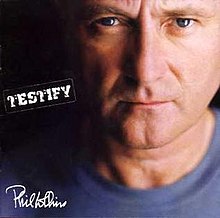Testify (Phil Collins album)
| Testify | ||||
|---|---|---|---|---|
 |
||||
| Studio album by Phil Collins | ||||
| Released | 11 November 2002 (UK) | |||
| Recorded | 2000–2002 (Switzerland and United States) | |||
| Genre | Pop rock | |||
| Length | 57:16 | |||
| Label | Face Value / Atlantic | |||
| Producer | Phil Collins, Rob Cavallo | |||
| Phil Collins chronology | ||||
|
||||
| Singles from Testify | ||||
|
||||
| 2016 reissue cover | ||||

Recreated cover photograph, as part of Collins' 2016 studio album reissues
|
||||
| Professional ratings | |
|---|---|
| Aggregate scores | |
| Source | Rating |
| Metacritic | 34/100 |
| Review scores | |
| Source | Rating |
| AllMusic | |
| Blender | |
| E! Online | C |
| Mojo | |
| People | (mixed) |
| Q | |
| Rolling Stone | |
| Uncut | |
| USA Today | |
Testify is the seventh solo studio album by English singer-songwriter Phil Collins. The album debuted at No. 30 on the American Billboard 200 albums chart, which was also the album's peak position. It was also the second Collins studio album where no track peaked within the American top 40 singles chart. It was also his lowest charting album in the UK, becoming his only solo effort not to reach the Top 5. However, the album achieved success in some countries of Continental Europe. It is his second album not to be co-produced by Hugh Padgham, who co-produced Collins' most successful albums.
Meat Loaf's album Couldn't Have Said It Better was originally to be titled Testify, but was retitled in anticipation of Collins' release.
Despite the shortage of success the album achieved, his subsequent First Final Farewell Tour proved to be very popular.
The album was reissued as a deluxe edition on CD, vinyl and digital on 15 April 2016, including a new second disc with bonus tracks.
Testify was crafted over a two-year period at Collins' home in Switzerland, and was recorded in France and Los Angeles. Most of the album's twelve tracks are derived from demos Collins made in his bedroom studio and finished off with the help of producers Rob Cavallo and James Sanger, engineer Allen Sides, guitarist Tim Pierce, and bassist Paul Bushnell. Collins worked extensively with computers during production, work that can be seen throughout the album. After Collins made Dance into the Light without any drum machine, he returned to the device for Testify.
The album begins with an up-tempo "Wake Up Call". It was based on a 16-bar doodle Collins wrote, and only began to formalise when he brought it into studio. The title track, the longest and most complex sounding song on the album, is according to Collins "one of the most direct and most personal love songs I have ever written". Another up-tempo song, "Don't Get Me Started" follows a tradition of critical statements about politics and society Collins began with "That's Just the Way It Is", "Another Day in Paradise", and "Both Sides of the Story" in his previous albums.
...
Wikipedia
